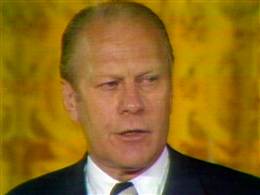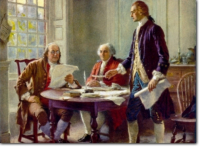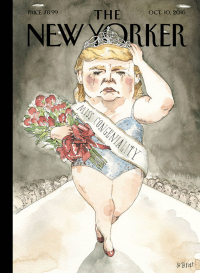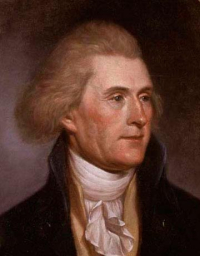
The Nixon Thesis of Conflict, which emerged from the experience of Vietnam, was my generation’s first such crisis. It taught many false lessons, but one part of it was true, and was put well by Gerald Ford after Nixon flew away.
“Our Constitution works; our great Republic is a government of laws and not of men. Here the people rule.”
While the Nixon Thesis held throughout most of my life, the knees jerking whenever Democrats seemed to threaten, it held because of the Ford corollary. The order we defend is the order of our Constitution, and our laws, which are more important than any man or woman. It’s a theme President Obama has gone to again-and-again as Donald Trump challenged it.

The heart of the 2008 Crisis that brought Barack Obama to power lay in its challenge to our established institutions. Wall Street and the world economy crashed on the shoals of a war based on lies and a massive fraud against the mortgage market.
Such threats are a thread that runs through all of America’s political crises. What the Confederates, Populists, Nazis, hippies and the “Tea Party” all had in common was that a rejection of democratic norms, norms which hold that change comes slowly and that the people have to lead it. The slow pace of change is frustrating but it leads to a highly-flexible society that can stand immense shocks which a more brittle, if faster moving, autocracy will collapse under.
A government of laws, and not of men.

This is what makes America great. The fatal flaw of Richard Nixon lay in questioning this. “When the President does it, that means it is not illegal.” That statement is the snake which, like slavery, lay under the table of the Nixon Thesis, poisoning it, infecting his followers, preparing to strike it down.
The last eight years have seen a growing call for Civil War on behalf of men and women wedded to Nixon’s rejection of democratic norms. Writers and pundits and politicians have said all along – through Sarah Palin and birtherism, through obstruction and the Rise of Trump – that this rejection is dangerous. We have laughed at Trump but at the Third Debate it all became deadly serious.

Right now, there remain some who are trying to weasel out of the plain language Trump used to Chris Wallace. People like Joe Scarborough and Mark Halperin , who followed Nixon’s assumption of Democratic illegitimacy throughout their lives, died on Trump’s hill after the debate. They should lose their positions and be consigned to the same oblivion Trump himself now faces.
There are also pessimists, like Michael Moore, who fought the anti-democratic excess of Nixonism, unsuccessfully, for most of their lives, who will insist the excesses can’t be resisted.
But such excesses can be resisted. They must be. They will be.
This is not to say it will be easy. Like those who have come before him, Trump has millions of followers. But democracy has more, and when America has come to violence over threats to democratic legitimacy, we have risen up, as one people, to stamp them out.
Unlike every other nation on the face of the Earth, America is an idea. That idea is democratic legitimacy.
American Patriots are willing to die for democratic legitimacy. Against enemies both foreign and domestic. We have had generals, plantation owners, billionaires, and demagogues throughout our history challenging that legitimacy. We have beaten them, one by one, proving that governments derive their just powers from the consent of the governed, and that we will not lose this last, best hope of Earth.

Thus the crisis is joined. Thus the election ends. And we’ll see how many people really are willing to die on Trump’s hill.
My guess is it won’t be many. But however large the number, real Americans will be willing to die in resistance. My prayer is that Trump’s rebellion will be more like Shay’s Rebellion, to which Thomas Jefferson referred when he wrote about liberty being watered by the blood of patriots and of tyrants in 1787, rather than those bloody conflagrations Lincoln and FDR faced.
After the fire of 2016, Americans will be called upon to be firemen. And firewomen.
It is a noble calling.










